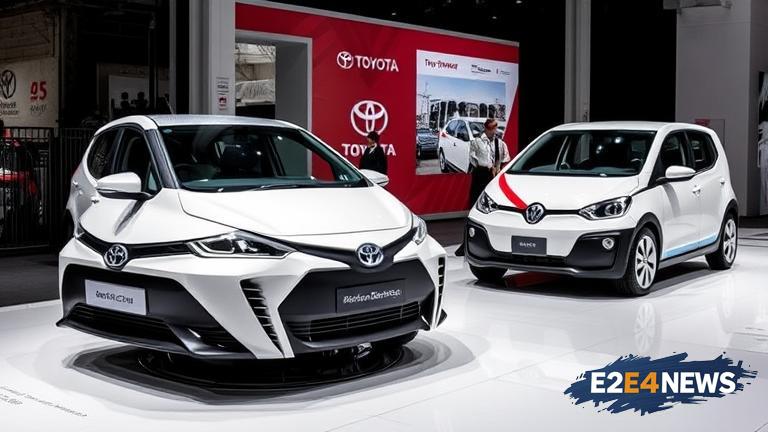The South African automotive market is on the cusp of a revolution with the impending launch of affordable electric cars by Toyota and Volkswagen. This move is expected to disrupt the traditional internal combustion engine-dominated market and provide consumers with a more sustainable and environmentally friendly alternative. The introduction of electric vehicles (EVs) by these two automotive giants is a significant development, given their vast market share and influence in the country. Toyota, known for its popular models such as the Hilux and Corolla, is set to launch its first electric car in South Africa, which is expected to be priced competitively. Volkswagen, on the other hand, has already announced plans to launch its ID.4 electric SUV in the country, which is expected to be a game-changer in the market. The launch of these affordable EVs is expected to increase adoption rates, driven by growing consumer awareness of the benefits of electric vehicles, including reduced operating costs and lower emissions. The South African government has also introduced incentives to encourage the adoption of EVs, including tax breaks and investment in charging infrastructure. However, the lack of charging infrastructure remains a significant challenge, with many areas still lacking access to charging points. Despite this, the launch of affordable EVs by Toyota and Volkswagen is expected to drive investment in charging infrastructure, with many companies already investing in the development of charging networks. The introduction of EVs is also expected to create new job opportunities in the automotive sector, including in manufacturing, sales, and maintenance. Furthermore, the launch of affordable EVs is expected to have a positive impact on the environment, with reduced emissions contributing to a cleaner and healthier environment. The move is also expected to reduce the country’s dependence on fossil fuels, which is a significant contributor to greenhouse gas emissions. In addition, the launch of EVs is expected to stimulate innovation and investment in the automotive sector, with many companies already investing in research and development of new EV technologies. The South African automotive market is expected to undergo significant changes in the coming years, driven by the launch of affordable EVs and growing consumer demand for sustainable mobility. The launch of EVs by Toyota and Volkswagen is expected to be followed by other manufacturers, which will further increase competition and drive innovation in the market. The government is also expected to play a critical role in supporting the adoption of EVs, through the introduction of policies and incentives that encourage the development of charging infrastructure and the adoption of sustainable mobility. In conclusion, the launch of affordable electric cars by Toyota and Volkswagen in South Africa is a significant development that is expected to drive the adoption of sustainable mobility and reduce the country’s dependence on fossil fuels. The move is expected to have a positive impact on the environment, create new job opportunities, and stimulate innovation and investment in the automotive sector. As the market continues to evolve, it is expected that other manufacturers will follow suit, further increasing competition and driving innovation in the market. The future of mobility in South Africa is certainly looking bright, with the launch of affordable EVs marking a significant milestone in the country’s transition to sustainable mobility. The launch of EVs is also expected to have a positive impact on the economy, with reduced operating costs and lower emissions contributing to a more sustainable and environmentally friendly economy. The introduction of EVs is also expected to improve air quality, particularly in urban areas, which is a significant challenge facing many cities in South Africa. Overall, the launch of affordable electric cars by Toyota and Volkswagen in South Africa is a significant development that is expected to have a positive impact on the environment, economy, and society.
